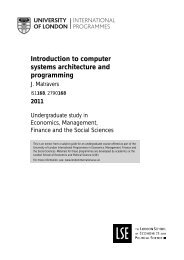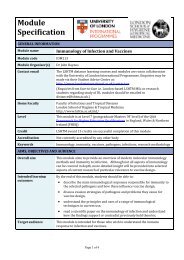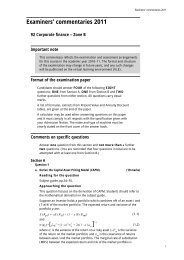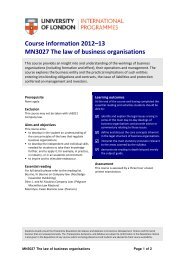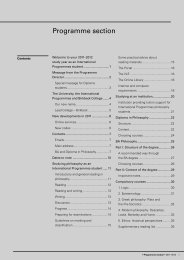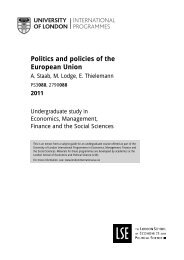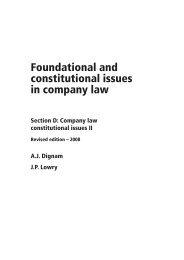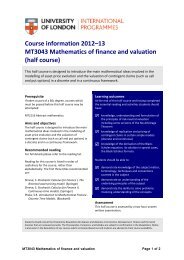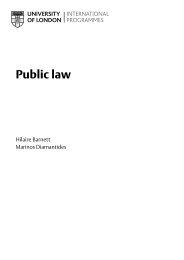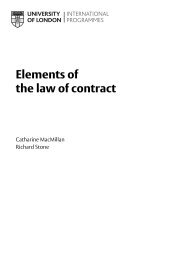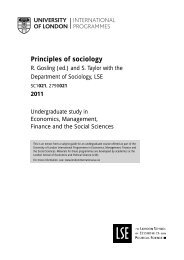Law and policy of international courts and tribunals - University of ...
Law and policy of international courts and tribunals - University of ...
Law and policy of international courts and tribunals - University of ...
Create successful ePaper yourself
Turn your PDF publications into a flip-book with our unique Google optimized e-Paper software.
<strong>Law</strong> <strong>and</strong> <strong>policy</strong> <strong>of</strong> <strong>international</strong> <strong>courts</strong> <strong>and</strong> <strong>tribunals</strong>: Section B<br />
Activity 3.1<br />
In the Agenda for Peace, the UN Secretary-General suggested that:<br />
38<br />
‘While the mediator’s effectiveness is enhanced by strong <strong>and</strong> evident<br />
support from the [Security] Council, the General Assembly <strong>and</strong> the<br />
relevant member States acting in their national capacity, the good <strong>of</strong>fices<br />
<strong>of</strong> the Secretary-General may at times be employed most effectively when<br />
conducted independently <strong>of</strong> the deliberative bodies. Close <strong>and</strong> continuous<br />
consultation between the Secretary-General <strong>and</strong> the Security Council is,<br />
however, essential to ensure full awareness <strong>of</strong> how the Council’s<br />
influence can best be applied <strong>and</strong> to develop a common strategy for<br />
peaceful settlement <strong>of</strong> specific disputes’ (para. 37).<br />
Do you agree with this approach? Under what circumstances do you think the<br />
good <strong>of</strong>fices <strong>of</strong> the UN Secretary-General are more likely to be successful in<br />
assisting parties to resolve the dispute between them?<br />
Feedback: see page 44.<br />
3.4 Fact-finding <strong>and</strong> inquiry<br />
Essential reading<br />
Merrills, Chapter 3.<br />
3.4.1 Features <strong>of</strong> inquiry as a means <strong>of</strong><br />
dispute settlement<br />
Inquiry as a distinct form <strong>of</strong> dispute resolution process involves an<br />
independent investigation <strong>of</strong> an issue disputed by two or more<br />
parties. The principal features <strong>of</strong> inquiry in this context are:<br />
It involves an inquiry into facts, not law. Collier <strong>and</strong> Lowe<br />
(essential readings, p.24) note that ‘if the dispute is a factual<br />
one, inquiry may itself settle it; if it has any legal content,<br />
inquiry may help to do so’.<br />
It involves the establishment <strong>of</strong> a specific type <strong>of</strong> panel to carry<br />
out the inquiry.<br />
It does not result in a binding outcome, unless the parties agree<br />
otherwise.<br />
The nature <strong>of</strong> the proceedings may vary – in some cases,<br />
inquiry proceedings can resemble arbitration or a judicial<br />
process, involving written submissions <strong>and</strong> oral hearings. See,<br />
for example, Merrills’ discussion <strong>of</strong> the Red Crusader inquiry at<br />
pp.53–56, <strong>and</strong> the Letelier <strong>and</strong> M<strong>of</strong>fitt case at pp.56–59.<br />
These features are discussed in detail in Merrills, Chapter 3, <strong>and</strong> in<br />
the chapter by Collier <strong>and</strong> Lowe in the Essential reading. The<br />
underlying rationale <strong>of</strong> fact-finding <strong>and</strong> inquiry is that by seeking<br />
an objective assessment <strong>of</strong> the issue in dispute, a way may be found<br />
for comprehensive resolution <strong>of</strong> the dispute.



